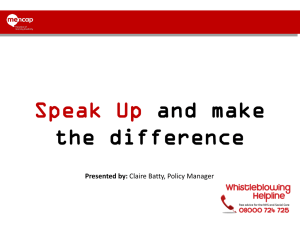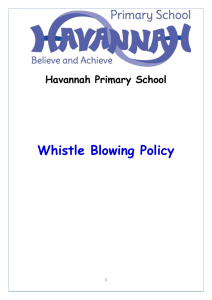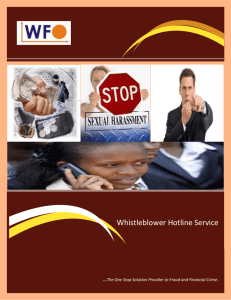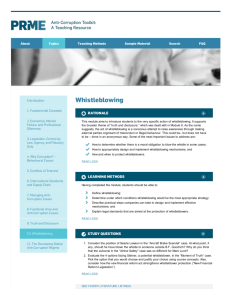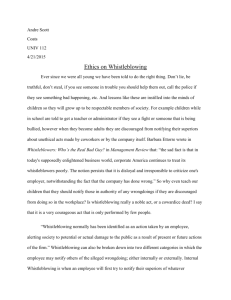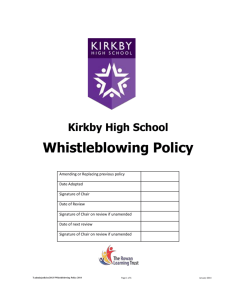Speaking up: information for CII members about whistleblowing
advertisement
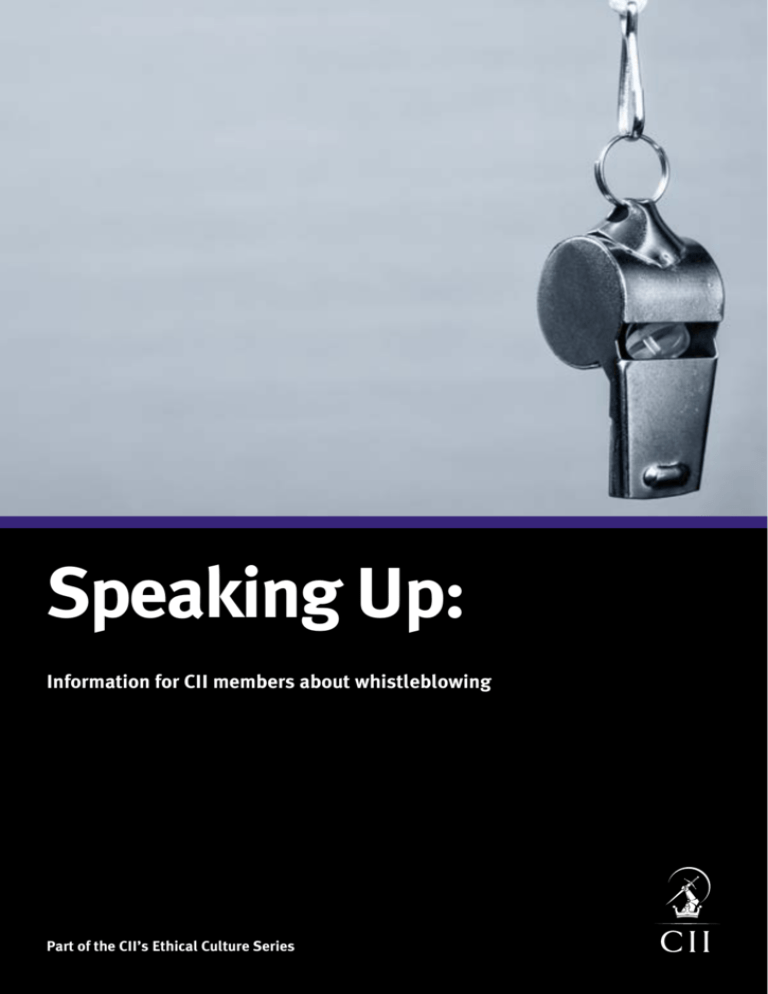
Speaking Up: Information for CII members about whistleblowing Part of the CII’s Ethical Culture Series A CENTURY OF PROFESSIONALISM 3Foreword 4Introduction 5What is whistleblowing? 5Why whistleblowing matters 5How whistleblowing differs from complaining 6The CII and whistleblowing 6What our Code of Ethics says about whistleblowing 6The obligations our members are under when it comes to whistleblowing 7An overview of the Public Interest Disclosure Act 1998 8How to be better prepared 8What to weigh up when a problem does arise? 10Deciding how to blow the whistle 11Frequently asked questions 12Members outside of the UK 12Members in small firms 12Members who do not work in the regulated environment of financial services 12Sources of advice on whistleblowing 13Links 13Other types of guidance on whistleblowing from the CII 14Concluding comments and key points This is the fourth in a series of guidance documents prepared by the Chartered Insurance Institute. The CII is grateful for Duncan Minty ACII, Chartered Insurance Practitioner, for developing this paper in the series. Disclaimer The guidance set out within this paper is meant to support the thinking of individuals and their firms, and nothing in the guidance should be used by firms to achieve compliance with any statutory and/or regulatory obligations. 2 Speaking Up: Information about whistleblowing contents Contents There are many characteristics that make you a professional person. One of them is upholding ethical standards of behaviour. That means not only striving to ‘do the right thing’ yourself, but also being prepared to challenge behaviour in others that falls short of the mark. This is not easy and even the model professional needs support to help navigate this. This is a difficult area and it is important to help guide people’s thinking. That’s why this CII guidance paper about how to blow the whistle on unethical behaviour is a useful addition to the CII’s ethical guidance series. Much is expected of the financial services professional and such expectations are only likely to increase. We shouldn’t be complacent about what we’ve achieved so far; some sectors outside of financial services are perceived to outperform us on ‘doing the right thing’. If we want to be up there amongst the best, we have to challenge those whose behaviour undermines the reputation of our sector. This guidance paper provides you with important information about your obligations, your options and what factors to weigh up. Most importantly however, it explains why whistleblowing matters. Speaking up about our concerns is a positive step to take and we encourage CII members to read this guidance paper so that we can all advance the professionalism of our sector together for the benefit of the public. David Hertzell Chair of the CII Professional Standards Board 3 Speaking Up: Information about whistleblowing foreword Foreword We recognise that from time to time, our members may become concerned about something they see or hear at work. Such concerns come in all shapes and sizes. Some will be relatively minor incidents of misconduct that can be easily resolved through normal company channels. Others may involve incidents of wrongdoing that seem too serious or pervasive for reporting through those normal channels. Knowing how best to raise those more serious concerns is important. They may be a sign of financial or reputational trouble for your firm or perhaps even of criminal wrongdoing. Yet reporting such concerns can seem daunting at times. That is why the CII has prepared this guide. It provides you with information about how to report your concern so that it can be properly addressed. It explains whistleblowing and the law and regulations connected with it, as well as what to weigh up when preparing to blow the whistle. And it seeks to give reassurance about the importance of giving voice to your concerns and from whom you can seek more detailed support when so doing. 4 Speaking Up: Information about whistleblowing introduction Introduction Whistleblowing is the raising of a concern, either within the workplace or externally, about a danger, risk, malpractice or wrongdoing which affects others. The concern could be raised by an employee, manager or director of the organisation concerned, and by a full time, temporary or former worker. The issue of concern could involve a dangerous activity, a serious risk to the business, malpractice in how an activity is being undertaken or wrongdoing in how the organisation is being run. The concern may be raised within the workplace, with a regulator, or in exceptional circumstances, with the wider public. The way in which you decide to raise a concern can matter – we’ll look at this in more detail later. Not everyone uses the term whistleblowing. Some organisations talk about ‘speaking up’ or ‘raising concerns’. Which is best depends on the context – simply ‘speaking up’ about your concerns is fine if your firm encourages openness, but runs into problems if your manager is unwilling to listen and respond to what you have to say. Whistleblowing tends to be associated with situations where you suspect that your firm’s management may not listen and respond in the manner you would hope for. At the end of the day though, what matters though is your willingness to ‘do the right thing’. Why whistleblowing matters Whistleblowing can save lives, jobs, money and reputations. It acts as an early warning system for misconduct, wrongdoing or dangerous behaviour. It alerts employers to problems within their firm and if reported externally, highlights issues that could influence regulators and the public. Some people mistake whistleblowing for disloyalty. The opposite is the case. Those who blow the whistle can be amongst the most loyal and public spirited of employees. They are helping the firm to address problems, hopefully before the consequences become too serious. This allows firms to resolve matters earlier on, so reducing the financial and reputational impact of what has happened. How whistleblowing differs from complaining Blowing the whistle and making a complaint are different. Someone making a complaint has a vested interest in the issue they’re complaining about: for example, that they’ve been unfairly treated or discriminated against at work. Someone blowing the whistle usually has no direct, personal interest in the dangerous or illegal behaviour they’re raising; they are simply trying to alert others to something they feel needs urgent attention. This difference matters, for a complainant would be expected to provide evidence about the issue they’re raising, while there is no such expectation on a whistleblower. It is for others to investigate the malpractice being raised by the whistleblower. 5 Speaking Up: Information about whistleblowing what is whistleblowing? What is whistleblowing? The CII has a formal procedure for investigating complaints against its members (available in print or from the CII website). Such complaints have to relate to the requirement that members uphold the laws of the CII, as set out in the Charter, bye-laws, regulations, codes and other requirements of the Institute. The CII isn’t able to respond to whistleblowing approaches from its members or from the public. We ask those wanting to blow the whistle outside of their firm to contact the relevant regulatory authority, which in the majority of cases will be the Financial Conduct Authority. This is because regulators have specific powers to investigate such concerns and apply any necessary sanctions. The CII will take into consideration any sanctions imposed by a regulator upon a member of the Institute when weighing up the need for any disciplinary action against that person. What our Code of Ethics says about whistleblowing The Code of Ethics applies to all members of the Institute. It is made up of five principles, each of which is supported by a number of specific requirements and reflective questions. The Code’s second principle says this: “You must act with the highest ethical standards and integrity.” One of the questions under this principle that members are asked to reflect upon is: “Does my organisation have a whistleblowing policy?” And while the Code’s third principle refers to client confidentiality, the first principle about complying with all relevant laws and regulations takes precedence and requires a member to “give confidential information to the relevant authorities where the information relates to a criminal act or fraud by your client”. As CII members are all individuals, the approach taken by the Code of Ethics towards whistleblowing is to focus first and foremost on the individual qualities, rather than the organisational processes, that support it. So, for example, one of the commitments under the Code’s second principle is for members to be honest, trustworthy and open, and one of the ways in which the Code then suggests members seek to support this commitment is by questioning whether their firm has a whistleblowing policy. The obligations our members are under when it comes to whistleblowing All members of the CII are under an obligation to carry out their work in accordance with the Institute’s Code of Ethics. In addition to this, certain categories of members are under further obligations to regulatory authorities: for example, the Financial Conduct Authority (FCA) and the Ministry of Justice. So, for example, an ‘approved person’ under the FCA’s Approved Persons regime is under an explicit duty to deal with the regulator in an open and cooperative way and “to disclose appropriately any information of which the FCA or the PRA would reasonably expect notice”. The FCA’s Handbook also refers to how an approved person should act in relation to a worker making a ‘protected disclosure’ under the Public Interest Disclosure Act 1998 (see below). The FCA makes clear that any approved person found to have acted to the detriment of a worker in such circumstances could find their approved status under review. Other members could be under other forms of obligation depending on their specific role within the organisation. Examples of legislation setting out such obligations include the Pensions Act 2004 and the Proceeds of Crime Act 2002. 6 Speaking Up: Information about whistleblowing what is whistleblowing? The CII and whistleblowing The Public Interest Disclosure Act 1998 makes it unlawful for an employer to dismiss or victimise a worker for having made a ‘protected disclosure’ of information. What follows is an outline of the protection provided by the Act: more detailed information about the Act can be obtained from the leading whistleblowing charity, Public Concern at Work. The Act provides protection under four categories of disclosure: disclosure to an employer, to a ‘prescribed person or body’ (such as a regulator), to the wider public and whilst obtaining legal advice. A disclosure will not ‘qualify’ for protection unless, in the reasonable belief of the worker, the information is in the public interest and falls into one or more of the following categories of ‘wrongdoings’: a criminal offence; failure to comply with legal and regulatory obligations; miscarriages of justice; dangers to health or safety; dangers to the environment, and; deliberate concealment of any of those things. A worker making a qualifying disclosure to a ‘prescribed person or body’ will also be protected if he/she reasonably believes that the information (and the allegation contained within it) is substantially true. The Government has published a list of ‘prescribed people and bodies’, most of which are Government departments and regulatory authorities such as the Financial Conduct Authority. Note that this further protection only applies if the qualifying disclosure falls within the remit of the ‘prescribed person or body’. A qualifying disclosure made to the wider public (such as the media) is also protected, but only if a number of detailed conditions are met. There is no qualifying period of employment. The protection provided by the Act starts immediately upon employment and covers workers, contractors, trainees and agency workers. 7 Speaking Up: Information about whistleblowing what is whistleblowing? An overview of the Public Interest Disclosure Act 1998 It’s worth spending a little time becoming familiar with your speaking up obligations and about how to raise a concern. Reading this whistleblowing guide is a good way of thinking ahead, as is: • being familiar with the difference between complaining and whistleblowing • understanding how to weigh up the seriousness of any situation you may become concerned about •checking whether your firm has a whistleblowing policy, and if not, what you might do to encourage one to be produced •gauging the extent to which your firm has an ‘open culture’ in which concerns can be shared and discussed, and if not, how you might influence the firm to move in that direction •reflecting upon how approachable you are to a colleague who might be thinking of sharing a serious concern with you • being aware of where you might turn, should you need more information about whistleblowing •weighing up which of your colleagues you would feel comfortable approaching, should you wish to share a concern •understanding how you would build a case for any concern you might have, so that what you report has more credibility. What to weigh up when a problem does arise Being faced with something that you think is serious enough to warrant blowing the whistle about can be daunting and worrying. You may feel torn between letting the truth be known and being loyal to your colleagues and firm. However, doing what you feel is right is important, for both yourself and the profession around which you have based your career. So while you may initially feel uncomfortable with the problems that blowing the whistle may stir up amongst other employees and for your firm, it is just as important to think of other loyalties that are wider than those immediate concerns. Think of those elsewhere in the firm whose jobs could be at risk from the wrongdoing going unreported. And while blowing the whistle on the wrongdoing may cause difficulties for your firm, think of how much more serious could be the financial and reputational impact of the wrongdoing going unreported. Investing a little time early on can pay dividends later on. Here are some ideas you might want to weigh up when a potential whistleblowing situation does arise. • be clear about the facts of the case. Write them down and add to that list as events unfold •consider the situation from different perspectives. Could there be another reason for the events you’ve encountered? Are any grey areas material to what has happened, or peripheral? •be objective and clear minded when recording what you’ve encountered. Stand back from the immediacy of events and take careful stock of what has been going on •carefully weigh up just how serious those events have been and whether there might be a quite simple way of resolving the situation •compare what you’ve encountered with the commitments set out in the code of ethics of your firm and of this Institute. Be clear about which ethical commitments are being undermined by the events you’ve encountered 8 Speaking Up: Information about whistleblowing how to be better prepared How to be better prepared be influencing your present thoughts. If your involvement is more than peripheral, should you be lodging a complaint instead of blowing the whistle? •consider discussing the situation with a trusted colleague or good friend. A second opinion is invariably reassuring and can sometimes illuminate a situation in new and revealing ways. Taking steps such as these helps you establish whether you have reasonable grounds for believing that your concerns are substantially true. An odd turn of phrase perhaps, but from a legal perspective, an important one when deciding who to blow the whistle to. Your next step should be to tune into the whistleblowing environment you’re working within. For this, you need to consider: •any specific obligations you may be under to blow the whistle on the events you’ve encountered (for example, if you are an ‘approved person’) •whether your firm has a whistleblowing policy and if it does, what options it presents you with •the degree of overlap between any of the people mentioned in the whistleblowing policy and the events you’re considering blowing the whistle on •the level of confidence you have in the individuals referred to in the various reporting options set out in the whistleblowing policy •how comfortable you are with how the culture of your firm is likely to handle the whistle being blown; (for example, in terms of confidentiality, victimisation etc) •any other whistleblowing events that may have occurred within your firm and what you know of how the firm handled them. If your firm does not have a whistleblowing policy, you will have to weigh up whether there is someone in your firm who you feel could be approached with the concern you have. If there isn’t such a person, then you should consider blowing the whistle to a ‘prescribed body’, such as the Financial Conduct Authority. 9 Speaking Up: Information about whistleblowing how to be better prepared •take stock of any involvement you may have had in the situation and how your own interests may It can be extremely useful at this stage to seek impartial advice about the options available to you for blowing the whistle. This is because the legislation affording you protection when blowing the whistle is complex and, at times, undergoing change. Many people considering blowing the whistle contact the leading whistleblowing charity, Public Concern at Work. They provide independent and confidential advice to workers who are unsure about whether or how to blow the whistle. Their free advice line is managed by qualified lawyers with a wealth of experience in whistleblowing law and practice. Your options for blowing the whistle will be influenced by: •the level of confidence you have in the reporting options, and the reassurances, set out in your firm’s whistleblowing policy •how important remaining anonymous is to you and the extent to which you feel each reporting option is able/likely to respect this • the extent to which you are confident that your concerns are substantially true • whether you are an approved person under the Financial Services and Markets Act • whether your disclosure will ‘qualify’ as a protected disclosure under the Public Interest Disclosure Act •whether the events you’ve encountered fall within the remit of a ‘prescribed person or body’, for example the Financial Conduct Authority (FCA) •the immediacy and seriousness of events that may be unfolding around you: for example, do they present any danger to someone’s life? •in the event of you having previously raised this concern, how it was treated and what you know of their response. For many members of the CII, working in the regulated environment of financial services, this adds up, in the vast majority of cases, to a choice between blowing the whistle within your firm, or to the FCA (in its role as a ‘prescribed body’). The FCA strongly encourages workers to speak up about their concerns within their firm first, but recognise that sometimes this may not be feasible. If you’ve decided to blow the whistle within your firm, you should follow the procedures set out in its whistleblowing policy. If you’ve decided to make a ‘protected disclosure’ to the FCA, your concern should fall into one or more of the following categories: • a criminal offence •a failure to comply with legal obligations (such as those covered by the Financial Services and Markets Act) • a miscarriage of justice • a danger to health or safety • a danger to the environment, and • a deliberate concealment of any of those things. And in addition, you should have a reasonable belief that the information you are disclosing to the FCA (and the allegation contained within it) is substantially true and in the public interest. The FCA has a specific page on its website for whistleblowers, on which you’ll find answers to frequently asked questions and details of the dedicated telephone line it operates for whistleblowers. 10 Speaking Up: Information about whistleblowing how to be better prepared Deciding how to blow the whistle Question: Can I blow the whistle to the CII about concerns involving one of its members? Answer: The CII isn’t able to respond to whistleblowing reports. Members are asked to report their concerns to a ‘prescribed person or body’, such as the Financial Conduct Authority (FCA). This could provide the whistleblower with legal protection under the Public Interest Disclosure Act 1998 that they wouldn’t have if the CII dealt with their concerns. Question: Where can I get more advice about how to blow the whistle? Answer: We would recommend members talk to the charity Public Concern at Work, who offer a free, independent and confidential advice line. Question: Do I have to raise a concern internally within my firm first? Answer: The CII would strongly encourage members to consider blowing the whistle internally within their firm first. If however they are worried about the response they might receive, or have already done so and are unhappy with the response (or lack of) they did receive, then they should consider approaching a ‘prescribed person or body’, which in many cases will be the FCA. Question: If I blow the whistle to the FCA, will they keep my identify confidential? Answer: The FCA cannot give any categorical assurance on confidentiality (for reasons they explain on their website), but they do seek to do their best to protect the whistleblower’s identify. Question: Do I get legal protection when I blow the whistle? Answer: The legal protection given to whistleblowers is influenced by several factors and needs to be weighed up with care. We would strongly recommend that members seek advice on this by contacting the confidential advice line provided by the charity Public Concern at Work. 11 Speaking Up: Information about whistleblowing frequently asked questions Frequently asked questions The legal protection for whistleblowers varies across different countries. This guide focuses on the situation for whistleblowing as it currently exists in the UK. CII members who work outside the UK should seek advice locally on the legal protection available to whistleblowers. They should also consider how they might contribute to a culture supportive of whistleblowing within their firm and local insurance market. Getting that supportive culture right is a key factor in reassuring potential whistleblowers that voicing their concerns is a positive act that could save jobs and protect revenue and reputations. Members in small firms Whistleblowing in small firms can be just as difficult as in larger firms, for it’s likely that everyone knows each other and works in closer proximity. In fact, those characteristics could make whistleblowing even more difficult. While drawing up a whistleblowing policy may seem a rather cumbersome task for a small firm, it could prove just as valuable as for any larger firm. Members who do not work in the regulated environment of financial services Members whose work doesn’t fall within the remit of a regulator will have different options for blowing the whistle than those whose work is regulated. Clearly, blowing the whistle within the organisation they work for remains a key option. It’s also worth checking the list of ‘prescribed people and bodies’ to see if their concerns fall within the remit of any other oversight body. Sources of advice on whistleblowing There are sources of confidential advice that you could turn to when considering whether or not to blow the whistle. Your firm might use an independent third party whistleblowing service that provides you with advice as well as an option for reporting your concerns. The charity Public Concern at Work has a free and confidential advice line for whistleblowers. The Financial Conduct Authority has a whistleblowing telephone line, but it is orientated more towards receiving reports of whistleblowing incidents and does not give legal advice. 12 Speaking Up: Information about whistleblowing frequently asked questions Members outside of the UK The Financial Conduct Authority’s whistleblowing page – http://www.fca.org.uk/site-info/contact/whistleblowing Public Concern at Work’s home page – http://www.pcaw.org.uk/ The Government’s list of ‘Prescribed People and Bodies’ – https://www.gov.uk/government/uploads/system/uploads/attachment_data/file/183340/11-641blowing-the-whistle-to-a-prescribed-person.pdf Other types of guidance on whistleblowing from the CII This is one of three guides on whistleblowing produced by the CII. It is specifically aimed at those members who are considering blowing the whistle and wish to know more about the options available to them. The other two guides are aimed at: • managers who find themselves having to respond to an employee who is blowing the whistle to them •senior directors who might be responsible for implementing and overseeing their firm’s whistleblowing arrangements. These will be available on the professional standards section of the CII website from July 2014. 13 Speaking Up: Information about whistleblowing frequently asked questions Links Whistleblowing has a role to play in maintaining the professionalism of the insurance sector. It allows serious concerns to be aired and addressed. At the same time, whistleblowing can sometimes feel like a challenging step to take, with all sorts of uncertainties attached. That’s why the CII has produced this guidance, so that should a member want to raise a serious concern, they can do so with greater confidence, knowing that speaking up is important for themselves, their firm and their profession. A summary of the key points 1. Whistleblowing matters. It can save lives, jobs, money and reputations 2. The CII’s Code of Ethics expects members to speak up about their concerns, as part of “acting with the highest ethical standards and integrity” 3. People blowing the whistle have protection under the Public Interest Disclosure Act 1998 when making a ‘protected disclosure’ 4. Many firms have a whistleblowing policy to encourage employees to speak up about their concerns 5. An ‘approved person’ has a duty to disclose information to the FCA or PRA of which they “...would reasonably expect notice” 6. The FCA has a dedicated whistleblowing hotline and is recognised as a ‘prescribed body’ under the Public Interest Disclosure Act 1998. This status can provide a whistleblower with legal protection not available if they blew the whistle to a professional body like the CII 7. Blowing the whistle can seen daunting, but doing what you feel is right is important, both for yourself and your profession 8. There are sources of impartial advice about how best to blow the whistle. 14 Speaking Up: Information about whistleblowing concluding comments Concluding comments CII Secretariat Chartered Insurance Institute 20 Aldermanbury London EC2V 7HY About the Chartered Insurance Institute (CII) Professionalism in practice The CII is the world’s leading professional organisation for insurance and financial services, with over 112,000 members in 150 countries. We are committed to maintaining the highest standards of technical expertise and ethical conduct in the profession through research, education and accreditation. Our Charter remit is to protect the public by guiding the profession. For more information on the CII and its policy and public affairs function, including examples of the range of issues in financial services and insurance that we cover, please see: www.cii.co.uk/policy 15 Speaking Up: Information about whistleblowing concluding comments Who to contact @CIIGroup Chartered Insurance Institute The Chartered Insurance Institute 42–48 High Road, South Woodford, London E18 2JP tel: +44 (0)20 8989 8464 email: customer.serv@cii.co.uk website: www.cii.co.uk © The Chartered Insurance Institute 2014 C14J_8934 (06/14)
